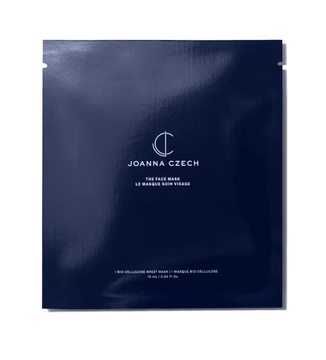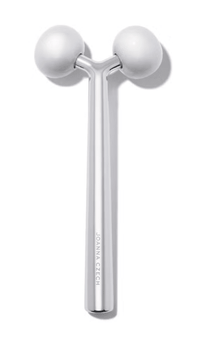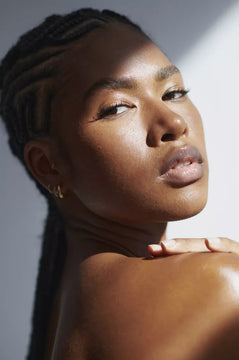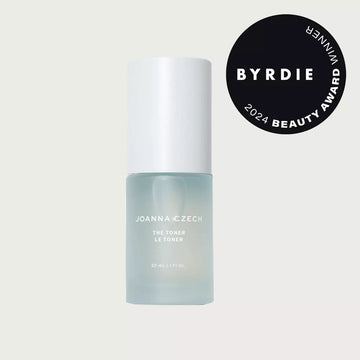5 Things I Learned at the Joanna Czech and 111SKIN Master Class
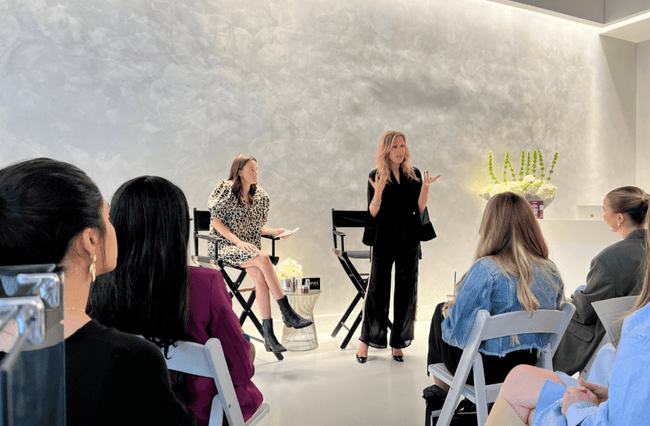
Last Thursday, a crowd of all ages gathered at celebrity aesthetician Joanna Czech’s small but upscale downtown studio. Pop music echoed through the room. Bottled green juice and boxed waters were passed out as 111SKIN CEO Eva Alexandrides, clad in black, bounced around and socialized before her skincare master class got started.
Alexandrides and her husband, Miami plastic surgeon Yannis Alexandrides, founded 111SKIN initially to serve their plastic surgery patients. In 2007, the London-based brand dropped its first product, the Dramatic Healing Serum, which was later renamed the REPAIR SERUM NAC Y². After success with the product within the walls of Yannis Alexandrides’ practice, the young company landed a few end-caps in department stores like Harrods before Czech discovered the brand.
Czech, who’s worked in skincare for more than 35 years, was interested in 111SKIN’s science-backed and innovation-focused products. She began selling their products, and she garnered immense U.S. support for 111SKIN through her love of its cryotherapy-inspired products. Later, the brands formed a working relationship that has lasted more than half a decade.
Part of that relationship, the brands collaborated to host a master class at Joanna Czech’s Dallas flagship location last week. Alexandrides and a Joanna Czech rep chatted about 111SKIN’s latest technologies and the innovation behind medical-grade skincare. Here are five things D Magazine learned.
The elements that cause our skin to suffer.
It’s no secret that sun exposure and pollutants in the air can affect the surface of your skin. Oftentimes the damage is visible, too, and guidelines for care are a well-known fact. Yes, like washing your face, which can eliminate the dirt and grime accumulated from a day out and about. And most notoriously, wear your SPF, people! Not only will it protect your face from getting fried, but it will prevent the fine lines and wrinkles that stem from a crisp sunburn.
On the other hand, invisible damage can also impact the skin. Invisible damage can arise from “the environment, different foods, drinks, stress, and even menopause,” Alexandrides said. The sun is a major contributor to invisible skin damage. One way you can check on your own invisible skin damage with a UV light. According to the American Academy of Dermatology Association, the more sun damage we accumulate over time, the greater our risk for developing skin cancer and prematurely aged skin. Because you can’t see it, invisible damage will eventually “come up to the surface” showing “severe signs of aging.”
If you dive into a medical-grade skincare routine “you can delay or completely stop” damage from taking effect, Alexandrides said. But how do you know you are targeting both external and internal damage? It depends on how well you know the ingredients in your products.
Skincare 101: Things to avoid in our daily routines.
When determining what works best for your skin, there are some no-no’s that Alexandrides swore by. “Products containing acids and retinol are easily overused,” she said. While these products are growing in popularity, thanks in part to social media, they can actually harm the skin when caked on too much. Following the instructions on your skincare packaging can protect you from causing irreparable damage to your skin, she suggested.
“Don’t have the perception that if something is tingling, it is working. You should stop using it,” Alexandrides said. Harsh ingredients are useful and can benefit skin health, but only if used properly.
One miracle ingredient that can make a difference.
Some of 111SKIN’s formulas include a (not so) secret ingredient: NAC, or N-acetyl cysteine. The regenerative antioxidant is used predominantly in health care for liver cell regeneration, but has even been used to supplement astronauts.
Now, you can buy NAC in 111SKIN care products in a topical form in its newly released Reparative line, including moisturizers, serums, sheet masks, and eye cream. One of the benefits of medical-grade skincare comes from the process of creation and the clinical testing. The brand’s in-house studies show overall improvement in hydration after using the product line, Alexandrides said. 111SKIN’s NAC products have received positive reviews online, too, with users praising the hydration. But, Alexandrides said you need to establish a routine with the products, just like any other skincare. “If you don’t continue using it, that hydration is not going to stay so it has to become a system.”
Skincare standards aren’t international.
One product that brought 111SKIN to the forefront of Westernized skincare was its bio cellulose sheet mask. The sheet masks weren’t as easily accessible on shelves in the U.K. or U.S. five years ago, when Alexandrides made a visit to South Korea. On her visit, she learned that sheet masks were trending in the K-Beauty arena. After collecting several to bring home, an idea was born for her own. Bio cellulose technology is also used to treat burn victims. It’s composed of tiny fibers that penetrate the skin and act as a second layer of skin when in use.
Now, 111SKIN’s range of face masks are trending amongst well-known celebrities, luxury spas, celebrity makeup artists, and beyond.
The sheet mask hole in the North American market is just one example of differing global skincare standards and trends. Regulatory bodies around the world set demands for skincare products, thus creating separate markets. If you are on the hunt for a specific type of skincare product and can’t find it in U.S. stores, take a look at the international market.
Building your skincare routine doesn’t have to be a DIY project.
In a post-COVID world, using the internet to learn has become commonplace. Influencers on all social media platforms are endorsing products and showing us their ultimate skincare routines.
While this can be helpful for a beginner, Alexandrides thinks skincare advice should be left to a professional. “I think we need to trust experts, rather than researching on your own. It’s like going to the dentist. You don’t tell them what you need, you ask them,” Alexandrides said.
Sometimes the professionals can identify what our skin needs before we know ourselves.
